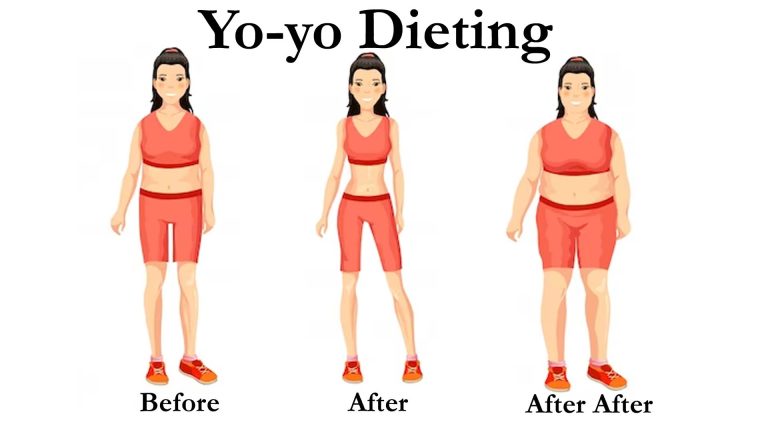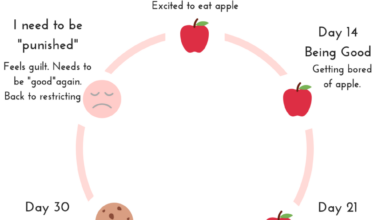
How to Win the Yo-Yo Diet Battle: Stop the Cycle and Find Lasting Health
How to win the yo yo diet battle – How to win the yo-yo diet battle? It’s a question many of us have grappled with, feeling trapped in a cycle of weight loss and regain. This frustrating dance with the scale often leaves us feeling defeated and discouraged.
But what if I told you that escaping the yo-yo diet cycle is possible, and it’s not about quick fixes or fad diets? Instead, it’s about understanding the root causes of this pattern, adopting sustainable strategies, and cultivating a healthy relationship with food and ourselves.
This journey requires a shift in mindset, moving away from restrictive diets and towards a more holistic approach that addresses both physical and emotional well-being. We’ll delve into the science behind yo-yo dieting, explore the psychological and societal factors that contribute to it, and empower you with practical tools and strategies to break free from this cycle.
Understanding the Yo-Yo Diet Phenomenon
The yo-yo diet, characterized by repeated cycles of weight loss and regain, is a common experience for many individuals striving to achieve their weight goals. While the initial weight loss may seem promising, the long-term consequences of this pattern can be detrimental to both physical and mental well-being.
The Yo-Yo Diet Cycle and Its Impact on Weight Management
The yo-yo diet cycle typically involves periods of strict dieting, leading to rapid weight loss, followed by periods of relaxation or indulgence, resulting in weight regain. This cyclical pattern can be frustrating and discouraging, leading to a sense of failure and contributing to a negative body image.The impact of yo-yo dieting on weight management is significant.
Studies have shown that individuals who engage in yo-yo dieting often find it increasingly difficult to maintain weight loss over time. This is due to several factors, including:
- Metabolic Adaptation:Repeated weight loss and regain can disrupt the body’s metabolism, making it more efficient at storing fat and burning fewer calories. This metabolic adaptation makes it harder to lose weight in the future.
- Hormonal Changes:Yo-yo dieting can lead to fluctuations in hormones such as leptin and ghrelin, which regulate hunger and satiety. These hormonal changes can make it difficult to control appetite and food cravings.
- Muscle Loss:During periods of weight loss, the body may lose muscle mass along with fat. This loss of muscle mass can further slow down metabolism and make it harder to maintain weight loss.
Psychological Effects of Yo-Yo Dieting
Yo-yo dieting can have a significant impact on mental health, contributing to:
- Low Self-Esteem:Repeated weight loss and regain can lead to feelings of inadequacy and self-criticism, affecting overall self-esteem.
- Body Image Issues:Yo-yo dieting can reinforce negative body image, leading to feelings of shame and dissatisfaction with one’s appearance.
- Anxiety and Depression:The frustration and disappointment associated with yo-yo dieting can contribute to feelings of anxiety and depression.
- Eating Disorders:In some cases, yo-yo dieting can be a precursor to the development of eating disorders such as bulimia nervosa or binge eating disorder.
Physiological Effects of Yo-Yo Dieting
Yo-yo dieting can have several physiological effects, including:
- Increased Risk of Chronic Diseases:Studies have shown that yo-yo dieting can increase the risk of developing chronic diseases such as heart disease, stroke, type 2 diabetes, and certain types of cancer.
- Elevated Blood Pressure and Cholesterol:Repeated weight loss and regain can contribute to fluctuations in blood pressure and cholesterol levels, increasing the risk of cardiovascular disease.
- Impaired Immune Function:Yo-yo dieting can weaken the immune system, making individuals more susceptible to infections and illnesses.
Real-Life Examples of Yo-Yo Dieting Experiences
“I’ve been yo-yo dieting for years. I lose weight, feel great for a while, then gain it all back. It’s a vicious cycle that’s really taking a toll on my self-esteem and health.”
Sarah, 35
“I tried every fad diet out there, but I always ended up gaining the weight back. I’m exhausted from this constant cycle of weight loss and regain.”
Winning the yo-yo diet battle is all about finding a sustainable lifestyle change, not just another quick fix. Part of that change might be taking better care of your joints, which can be a major factor in how much you can move and exercise.
Check out a beginners guide to joint health to learn about strengthening your cartilage and reducing inflammation. By taking care of your joints, you’ll be better equipped to embrace an active lifestyle that’s key to breaking the yo-yo diet cycle.
John, 42
These real-life examples highlight the common experiences of individuals who engage in yo-yo dieting. It’s important to recognize the detrimental effects of this pattern and seek sustainable approaches to weight management.
Identifying the Root Causes of Yo-Yo Dieting
Understanding the triggers and factors behind yo-yo dieting is crucial for developing effective strategies to break the cycle. It’s about recognizing the interplay between external influences and internal motivations that drive this pattern of weight fluctuations.
Societal Pressures and Media Influence
The media often portrays unrealistic body ideals, perpetuating a narrow definition of beauty and promoting a culture of constant striving for thinness. This can lead to feelings of inadequacy and pressure to conform, contributing to yo-yo dieting.
- The Thin Ideal:Magazines, television shows, and social media frequently feature images of thin individuals, often retouched to achieve an unattainable standard. This constant exposure can create a sense of dissatisfaction with one’s own body, leading to unhealthy weight loss attempts.
- Weight-Loss Advertisements:The media is saturated with advertisements promoting quick-fix weight loss solutions, often using misleading claims and unrealistic promises. This can encourage people to engage in fad diets or restrictive eating patterns that are unsustainable in the long term.
- Celebrity Culture:Celebrities are often held up as role models, and their weight fluctuations are often widely publicized. This can create a sense of pressure to achieve a similar physique, even though these individuals may have access to resources and support that are not available to the general public.
Personal Factors Contributing to Yo-Yo Dieting
Beyond societal pressures, individual factors play a significant role in yo-yo dieting. These factors can be deeply rooted in personal experiences, emotions, and beliefs.
- Body Image Issues:Negative body image can fuel yo-yo dieting. Individuals may engage in cycles of weight loss and regain as they strive to achieve an ideal that is often unattainable or based on unrealistic standards.
- Emotional Eating:Stress, anxiety, boredom, or loneliness can lead to emotional eating, where individuals use food to cope with difficult emotions. This can contribute to weight gain and subsequent attempts to lose weight, creating a yo-yo dieting cycle.
- Lack of Self-Acceptance:Individuals who struggle with self-acceptance may engage in yo-yo dieting as a way to gain control over their bodies and feel better about themselves. However, this approach often leads to a cycle of self-criticism and dissatisfaction.
- Perfectionism:Perfectionistic tendencies can contribute to yo-yo dieting. Individuals may set unrealistic goals for weight loss and become discouraged when they don’t achieve them, leading to periods of overeating and subsequent attempts to regain control.
- Past Trauma:Past experiences of trauma, such as childhood abuse or neglect, can also contribute to yo-yo dieting. These experiences can lead to emotional dysregulation and a tendency to use food to cope with difficult emotions.
Strategies for Breaking the Yo-Yo Diet Cycle
The yo-yo diet cycle is a frustrating and unhealthy pattern of weight loss and regain. It can take a toll on both your physical and mental health. To break free from this cycle, it’s essential to shift your focus from quick fixes to sustainable lifestyle changes.
Designing a Personalized Plan for Sustainable Weight Loss
A personalized weight loss plan considers your individual needs, preferences, and lifestyle. It’s not about following a rigid diet but about making gradual, sustainable changes that you can maintain long-term.
Winning the yo-yo diet battle is all about finding sustainable habits, and that includes delicious and satisfying meals. This butternut squash black bean chili recipe butternut squash black bean chili recipe is packed with protein and fiber, keeping you full and energized without sacrificing flavor.
It’s a perfect example of how healthy eating can be both delicious and fulfilling, a key ingredient in winning the yo-yo diet battle for good.
- Set Realistic Goals:Aim for a modest weight loss of 1-2 pounds per week. Rapid weight loss is often unsustainable and can lead to muscle loss and nutrient deficiencies.
- Focus on Healthy Habits:Instead of restricting entire food groups, focus on incorporating more fruits, vegetables, whole grains, and lean protein into your diet.
- Make Gradual Changes:Don’t try to overhaul your entire lifestyle overnight. Start with small, manageable changes, such as reducing your intake of sugary drinks or increasing your physical activity by 15 minutes a day.
- Seek Professional Guidance:A registered dietitian or a certified personal trainer can provide personalized guidance and support. They can help you create a plan that aligns with your individual needs and goals.
Managing Cravings and Emotional Eating
Cravings and emotional eating can be major triggers for yo-yo dieting. Learning to manage these urges is crucial for maintaining a healthy weight.
- Identify Triggers:Pay attention to the situations, emotions, or thoughts that lead you to crave unhealthy foods. This can help you develop strategies to cope with these triggers.
- Find Healthy Alternatives:When cravings strike, reach for healthy snacks like fruits, vegetables, nuts, or yogurt. These options provide satisfaction without the unhealthy consequences.
- Engage in Stress-Reducing Activities:Stress can contribute to emotional eating. Find healthy ways to manage stress, such as exercise, yoga, meditation, or spending time in nature.
- Seek Support:Talking to a therapist or counselor can provide valuable support in managing emotional eating and other psychological factors that contribute to yo-yo dieting.
Mindful Eating and Portion Control
Mindful eating involves paying attention to your food choices and eating habits without judgment. It helps you become more aware of your hunger and fullness cues, leading to better portion control.
- Eat Slowly and Mindfully:Take your time to savor each bite and pay attention to the flavors, textures, and aromas of your food. This can help you feel more satisfied with smaller portions.
- Use Smaller Plates:Using smaller plates can help you visually control your portion sizes.
- Avoid Distractions:Turn off the TV and put away your phone while you eat. Focusing on your meal can help you avoid overeating.
- Listen to Your Body:Pay attention to your hunger and fullness cues. Stop eating when you feel comfortably satisfied, not stuffed.
Building a Healthy Relationship with Food

The key to breaking the yo-yo diet cycle lies in building a healthy relationship with food. This means shifting your focus from restrictive diets and quick fixes to nourishing your body with a balanced and varied diet that supports your overall well-being.
Adopting a Balanced and Varied Diet
A balanced and varied diet provides your body with the essential nutrients it needs to function optimally. It encompasses a wide range of foods from all food groups, ensuring you get a diverse mix of vitamins, minerals, and antioxidants. This approach promotes long-term health and helps prevent nutrient deficiencies.
Delicious and Nutritious Meal Ideas
Here are some healthy recipe ideas for delicious and nutritious meals:
- Grilled Salmon with Roasted Vegetables:Grilled salmon is a great source of protein and omega-3 fatty acids, while roasted vegetables provide essential vitamins and minerals.
- Quinoa Salad with Grilled Chicken:Quinoa is a complete protein, and this salad can be customized with your favorite vegetables and dressing.
- Lentil Soup:Lentil soup is a hearty and affordable meal that is packed with protein and fiber.
- Chicken Stir-Fry:Chicken stir-fry is a quick and easy meal that can be made with a variety of vegetables and sauces.
- Fruit Smoothie:Fruit smoothies are a great way to start your day with a boost of vitamins and antioxidants.
The Role of Regular Physical Activity
Regular physical activity is crucial for weight management and overall health. It helps burn calories, build muscle mass, and improve cardiovascular health. Aim for at least 150 minutes of moderate-intensity aerobic activity or 75 minutes of vigorous-intensity aerobic activity per week.
Cultivating a Positive Mindset

The yo-yo diet cycle often stems from negative self-talk and an unhealthy relationship with your body. Shifting your mindset to embrace self-compassion and positive reinforcement is crucial for breaking free from this pattern.
Winning the yo-yo diet battle is all about finding a sustainable lifestyle that fits your needs and preferences. One key aspect is incorporating delicious and satisfying meals that don’t break the calorie bank. Check out these 5 classic Chinese recipes under 500 calories you can make at home , which offer a flavorful and healthy way to fuel your journey towards lasting success.
Challenging Negative Self-Talk and Body Image Issues
Negative self-talk can sabotage your weight loss efforts and perpetuate the yo-yo diet cycle. It’s essential to identify and challenge these harmful thoughts.
- Recognize Negative Thoughts:Pay attention to your inner voice. Do you often criticize yourself for your weight or body shape? Do you use harsh language or engage in self-deprecation?
- Challenge Negative Thoughts:When you notice negative self-talk, ask yourself: Is this thought true? Is it helpful? Would I say this to a friend? If the answer is no, try to reframe the thought in a more positive and realistic way.
- Practice Body Acceptance:Embrace your body as it is. Focus on its strengths and appreciate its ability to move, breathe, and support you.
- Seek Professional Help:If you struggle with negative self-talk or body image issues, consider seeking professional help from a therapist or counselor.
Encouraging Self-Compassion and Positive Reinforcement, How to win the yo yo diet battle
Self-compassion is essential for long-term weight management. It involves treating yourself with kindness, understanding, and acceptance.
- Practice Self-Kindness:Be gentle with yourself. Treat yourself as you would treat a loved one who is struggling.
- Focus on Progress, Not Perfection:Celebrate small victories and acknowledge your efforts, even if you don’t see immediate results.
- Avoid Comparing Yourself to Others:Everyone is on their own journey. Focus on your own goals and celebrate your achievements.
- Practice Gratitude:Take time each day to appreciate the positive aspects of your life, including your health and well-being.
Strategies for Managing Stress and Promoting Mental Well-being
Stress can trigger unhealthy eating habits and contribute to the yo-yo diet cycle. Managing stress is essential for maintaining a healthy weight and mindset.
- Identify Stressors:Pay attention to the situations or events that trigger your stress response.
- Develop Healthy Coping Mechanisms:Engage in stress-reducing activities like exercise, yoga, meditation, or spending time in nature.
- Prioritize Sleep:Aim for 7-9 hours of quality sleep each night.
- Practice Mindfulness:Focus on the present moment and be aware of your thoughts and feelings without judgment.
Seeking Professional Support: How To Win The Yo Yo Diet Battle

The yo-yo diet battle can be tough, and sometimes, you might need a helping hand to break free from the cycle. Seeking professional support from qualified experts can provide valuable guidance and tools to achieve sustainable weight management and improve your overall well-being.
Registered Dietitians for Personalized Nutrition Guidance
Registered dietitians (RDs) are trained professionals who specialize in food and nutrition. They can provide personalized guidance on creating a balanced and sustainable eating plan that meets your individual needs and goals. RDs can help you:
- Identify your dietary patterns and habits:RDs will work with you to understand your current eating habits and identify areas for improvement. This can help you make informed choices about your food intake.
- Develop a personalized meal plan:Based on your individual needs and preferences, RDs can create a meal plan that provides the necessary nutrients for optimal health and weight management. They can also help you find healthy alternatives to your favorite foods.
- Address nutritional deficiencies:If you have any nutritional deficiencies, RDs can help you identify and address them through dietary changes or supplements.
- Promote healthy eating habits:RDs can teach you about portion control, mindful eating, and other strategies to promote healthy eating habits for long-term success.
- Educate you about different diets:If you are considering trying a specific diet, RDs can provide evidence-based information and help you determine if it is a suitable option for you.
Therapy for Emotional Eating
Emotional eating is a common coping mechanism for stress, anxiety, boredom, or other negative emotions. However, it can contribute to weight gain and perpetuate the yo-yo diet cycle. Therapy can help you understand the root causes of emotional eating and develop healthier coping strategies.
A therapist can help you:
- Identify triggers:Therapy can help you recognize the situations or emotions that trigger emotional eating. This awareness allows you to develop coping mechanisms to manage those triggers.
- Develop healthier coping mechanisms:Instead of turning to food for comfort, a therapist can help you find healthier ways to deal with stress, anxiety, or other emotions. This can include exercise, relaxation techniques, or spending time with loved ones.
- Build a positive body image:Therapy can help you develop a more positive and accepting view of your body. This can reduce the pressure to diet and improve your overall self-esteem.
- Address underlying issues:Emotional eating often stems from underlying issues such as depression, anxiety, or trauma. Therapy can help you address these issues and improve your overall mental health.
Finding Qualified Professionals
If you are interested in seeking professional support, there are several resources available to help you find qualified professionals in your area:
- Academy of Nutrition and Dietetics (AND):The AND is a professional organization for registered dietitians. Their website provides a directory of RDs in your area. You can search by specialty, location, and other criteria.
- National Eating Disorders Association (NEDA):NEDA is a national organization dedicated to supporting individuals with eating disorders. Their website provides a directory of therapists and other professionals who specialize in eating disorders.
- Your primary care physician:Your doctor can also recommend qualified RDs or therapists in your area.
Last Recap
Winning the yo-yo diet battle is about reclaiming your health and happiness. It’s about embracing a lifestyle that nourishes your body, mind, and soul. By understanding the underlying factors, adopting sustainable strategies, and seeking support when needed, you can break free from the yo-yo diet cycle and create a healthier, more fulfilling relationship with food and yourself.
Remember, lasting change takes time and effort, but the rewards are well worth it. You are capable of achieving lasting health and well-being, and this journey begins with a commitment to yourself and your well-being.






